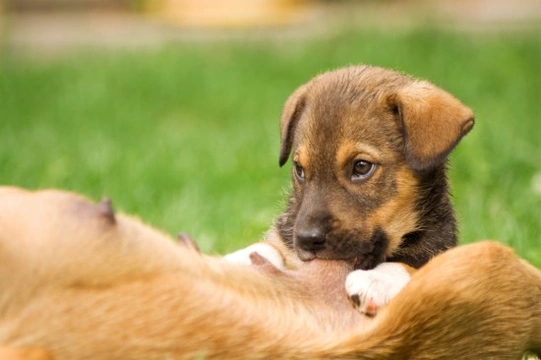
Mastitis in Dogs - Diagnosing, Treatment and Prevention
When you have a bitch with a litter of puppies, it is important to be aware of changes in the health and demeanour of your pet and her young. As vulnerable dependent offspring, any conditions that affect the puppies’ ability to drink milk from their mother can quickly become life threatening if not treated.
Mastitis is not a common condition; it is mainly found in nursing bitches however surprisingly there are cases found in females who are not breeding. The first signs you may notice could in fact be distress in the litter. You may hear loud on-going crying and notice a decline in condition in the puppies that cannot get milk. Thoroughly check over your bitch and if you find she is swollen, painful and hard to touch in the mammary area she may be suffering from mastitis.
What is Mastitis?
Mastitis is an infection that enters the mammary gland via the milk ducts causing inflammation and an environment for replication of the bacteria and thus spread of the infection. It is extremely painful for the bitch and may cause a variety of signs and symptoms. There are a number of possible causes; it is normally the case that while nursing the teats of the bitch can become sore and crack and bacteria which may be normally present can enter and multiply. The infection spreads throughout the mammary tissue and can cause various signs. When a bitch is nursing a litter of young it is important to be aware of mastitis, in rare cases she can become irritated and will refuse to allow the puppies near her as the pain may be overwhelming.
Signs of Mastitis
The first sign that your bitch is suffering from mastitis may not be from the bitch but from the puppies. In severe cases they will be unable to feed and as such you may hear constant crying from pups trying to feed and observe lethargy in those who are unable to obtain energy from the milk.
Signs may include:
- Swelling and redness in the mammary glands
- Mammary tissue that is hard to the touch
- Heat and pain in the mammary glands
- Depressed demeanour in the bitch
- Loss of appetite in the bitch
- Foul smelling odour and discharge from the nipple
- Lack of interest in the puppies
- Glands may abscess or rupture in very severe cases
- Puppies may become lethargic, cry and paw at the bitch
- In some cases the bitch may become snappy with the puppies due to the pain.
Diagnosing Mastitis
If you suspect your dog has mastitis you should seek the advice of a veterinary surgery as soon as possible. This may require an out of hours call if it is the evening or weekend , it is not recommended to delay as any restriction in feeding the puppies can be potentially life threatening. Generally an experienced veterinary surgeon will be able to diagnose mastitis on physical examination; the mammary tissue will appear hard, red and will be hot to touch amongst other signs. If there is a question over diagnosis, the vet may take a blood count or a sample of the fluid from the teats to examine.
Treatment of Mastitis
Treatment of each individual case of mastitis depends upon the severity of the infection. If a case has been caught early on your vet will prescribe a course of antibiotics which must be completed even once symptoms may look like they have disappeared. You may be advised to apply warm compresses on the affected teats on a regular basis to relieve the pressure and encourage the flow of milk. If milk supply is compromised you may need to hand feed supplement milk to her young puppies until the glands are free from infection.
If infection has been present for some time it may be necessary to lance or drain the glands, this may be done under local or general anaesthetic and the bitch will usually be placed on a drip as fluid therapy will assist with controlling the infection. The puppies will usually remain with the bitch in order to minimise stress during her treatment. In severe cases the vet may need to carry out a mastectomy which involves full removal of the gland, this is extremely rare and if treated promptly very few cases will result in such drastic surgery
If an older bitch who is not nursing puppies presents with mastitis it is usually necessary to perform additional tests as there is a possibility that in these cases there could be an underlying condition such as cancer of the mammary gland.
Prevention of Mastitis
Mastitis is limited to lactating females and as such the only way to guarantee there are no future incidents are to spay the bitch following weaning which will prevent her from breeding again.
While the puppies are with their mother there are a number of sensible hygiene measures that can be observed which help to reduce the likelihood of the lactating can bitch coming in to contact with bacteria which may cause mastitis. Some of these measures are below :
- Cleaning and changing the litter’s bedding regularly
- Prompt cleaning and monitoring of any wounds from sharp puppy claws.
- Ensuring any dirt is cleaned from the underside/teats of the bitch should she go outside with her litter and she is not splashing urine on her mammary glands which will be larger and heavier than normal.



